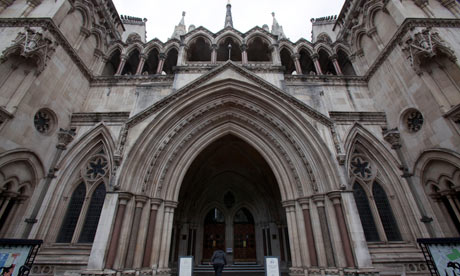
Litigants in person (LIPs) populate the high court and court of appeal. Many have meritorious claims or defences which they struggle to bring without legal aid. Some are obsessive. One chancery judge's clerk said "there are people who live in the Royal courts of justice". As soon as the building opens, in they trundle, through the Great Hall, armed with ring-binders, bottles of water and multiple carrier-bags.
He said judges sometimes struggled to save this type of LIP from being bankrupted by obsessive litigation. Judges would plead with them to stop ruining their health and squandering their assets. One LIP had spent £20,000 on a six-month dispute. The judge reminded him that this left him just £17,000 equity in the property in dispute, "You're ruining your life!" His clerk praised the judge, "This guy gets out of his pram sometimes, in his room, but he's very, very patient with litigants in person".
In the administrative court, Ossian enjoyed the unusual gift of a reading day, to prepare for an LIP challenging a grant of planning permission. The LIP had requested a five-day hearing. The listing office granted two. His 20 ring-binders were delivered late. Ossian said "the problem is getting him to stick the salient points". He had been aggressive. He insisted on representing himself, despite being a multi-millionaire.
In court, Ossian warned him to confine his arguments to a day. The LIP, in a very thick Greek accent, retorted that there must be a fair trial. Ossian smiled and asked if he would like to sit down, attempting to put him at ease. The LIP had applied to cross-examine all the planning authority's witnesses but Ossian released them, rapidly dismissing an application to join-in another applicant.
Ossian endeavoured to clarify the grounds, continually steering him off a stream of pedantic, irrelevant challenges. Luckily, the planning authority was represented by "one of the best planning silks". A chorus of supporters sat at the back of the courtroom. Next to them was a messy-haired boy on work experience, looking catatonic. I wondered if this would put him off studying law. I slept next to Ossian for most of the morning and Work Experience Boy was fast asleep, head on hands. A press reporter read a novel. At 12.31 pm an elderly supporter made an early start on her packed lunch.
As the litigant played to his audience, counsel used devices to fight off sleep - pretending to take notes or admiring the elaborate gothic light fittings and wood-carving high above. The authority's silk stared at us, face contorted in consternation or alarm, failing to understand the LIP, but Ossian would not have his eye caught. At 12.50 pm, the elderly lady bedded-down into a post-lunch snooze but was woken at 12.55 pm when Ossian interjected, smiling "Mr X, you must be in need of a break, having done so well".
After lunch, as the LIP waxed melodramatic, Ossian politely reminded him that this was not a theatre. He insisted he needed five days but Ossian firmly reassured him that he was 'doing very well'. As we approached 3.30 pm and Work Experience Boy was horizontal, Ossian attempted to truncate the separate arguments of bias against five councillors, punctuated by political speeches.
I've taken this point, Mr X.
I've taken this point, Mr X.
Well, I've got many more examples, My Lord!
Well, judges sometimes say "Give me your best point", [smiling].
My Lord, I can't choose! [Laughter from the 'audience'].
At 3.40 pm, 16 schoolchildren entered. At 4.30 pm, Ossian smiled, "I think you're drawing to a natural conclusion now, Mr X". Ossian reported, later, that the LIP had tried to continue his argument on the second day. The authority's silk took the whole morning and some of the afternoon. "I discouraged the young lad [counsel] for the developers from saying anything." Ossian acknowledged that most of the transcript would report the LIP's speech as "inaudible".
One day in the EAT, every applicant was alleging direct and indirect (race) discrimination and victimisation. One was bringing a case against a city council for refusing her a job, having brought a case each time the council rejected her 16 applications. David considered it curious that the applicant, a law graduate, had listed these: "evidence of her own vexatious litigation!" Another applicant was more extreme. David and her wingers laughed that my mere presence might provoke him into alleging bias. David thought there had been an increase in LIPs claiming discrimination.
Their sense of grievance was exacerbated when the EAT ruled that their applications disclosed no error of law. They were normally unaided in preparing because legal aid is not available but most were represented in the hearing by lawyers offering free services under the Employment Lawyers Advice Scheme. David had been a member and was greatly relieved by their help.
In most instances, LIPs' claims disclosed few arguable points of law. David dreaded cases where the lawyer opened by explaining "I am going to argue two grounds and Miss X is going to address you on grounds 3 to 97".
LIPs place an onus on the judge to shift from neutral umpire to pro-active helper, for which they are untrained. HC judges seldom request help from an advocate to the court. Most striking, here, is the disproportionate amount of resources painstakingly devoted to them - staff and court time, judge time, free legal help and emotional support, and corporate and public bodies' resources in opposing them.
The law affords multiple bites of the cherry. Some are hopeless repeat-players, paranoid, or have lost all sense of proportion, yet the case law and this research shows that judges are remarkably tolerant and the LIP needs to become an outstanding nuisance before they will classify him as a vexatious litigant. Obviously, many LIPS have meritorious cases but all but one I saw had a hopeless case.

